一般过去式总复习
图片预览

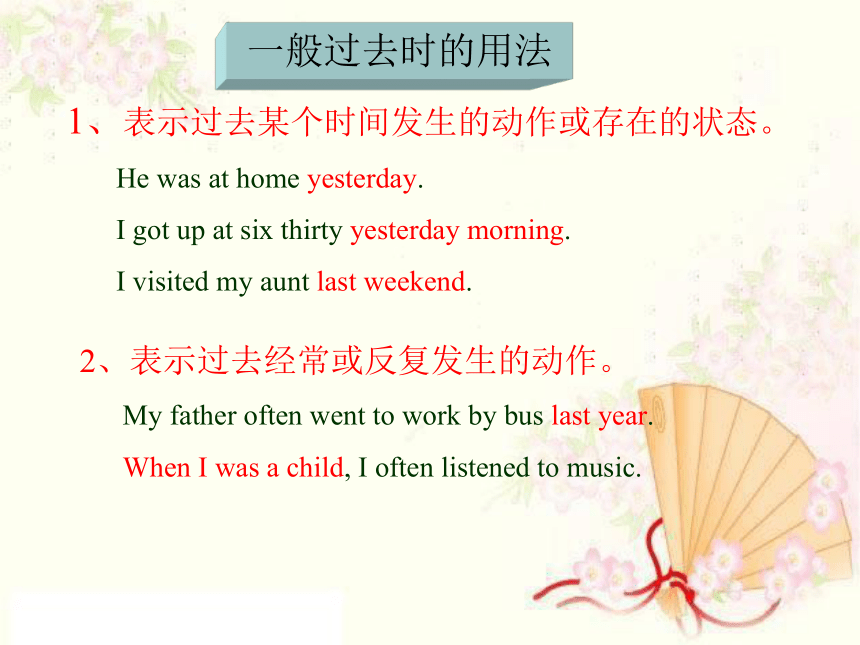
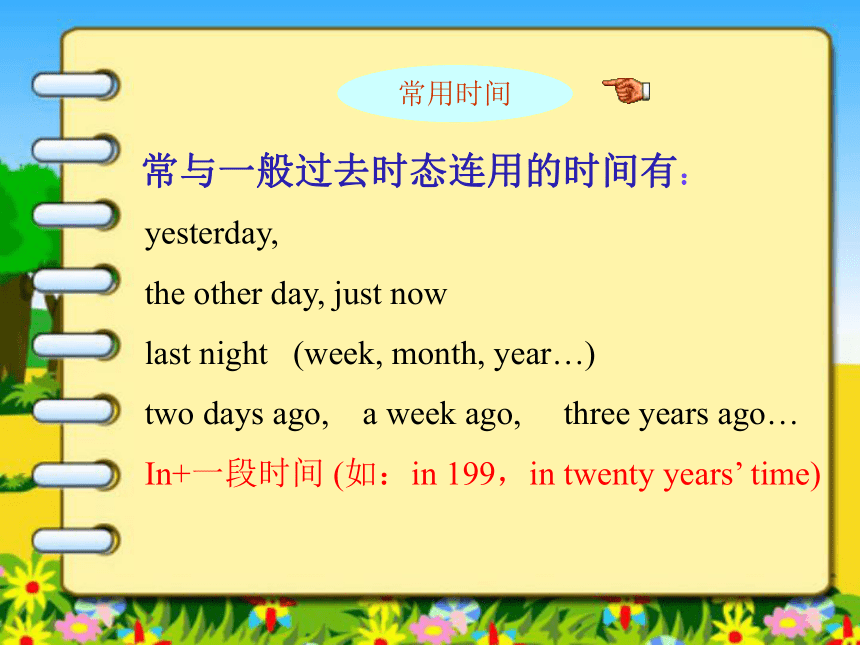
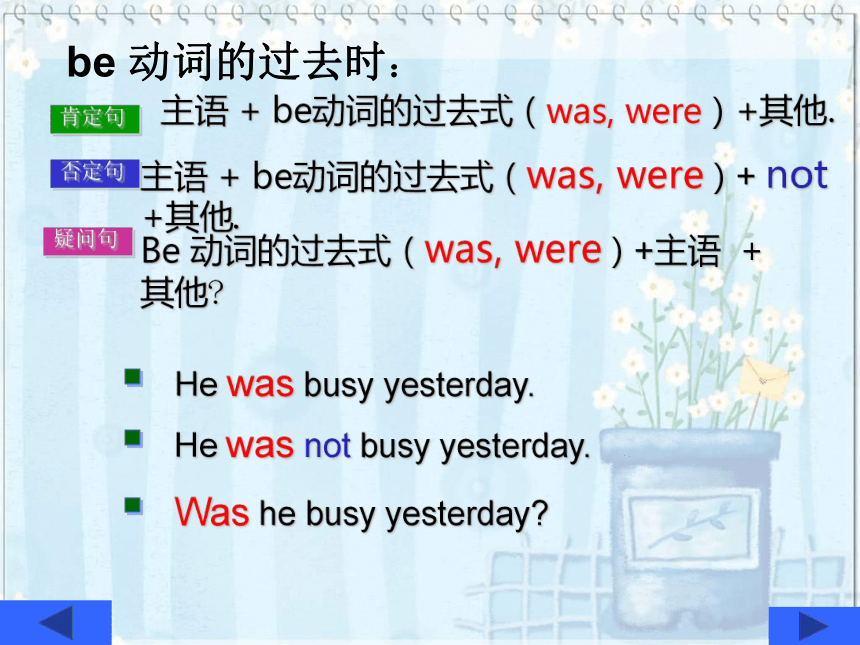

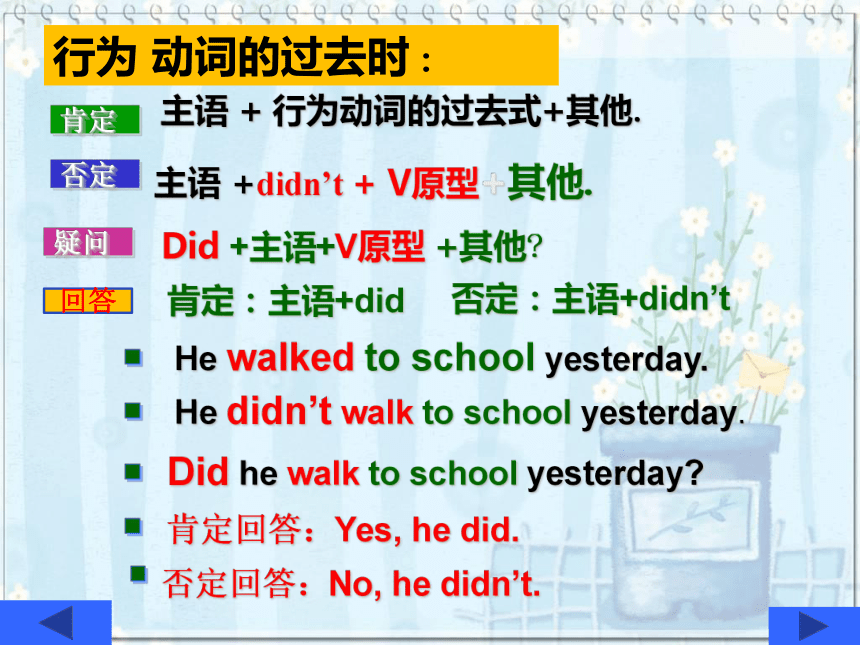
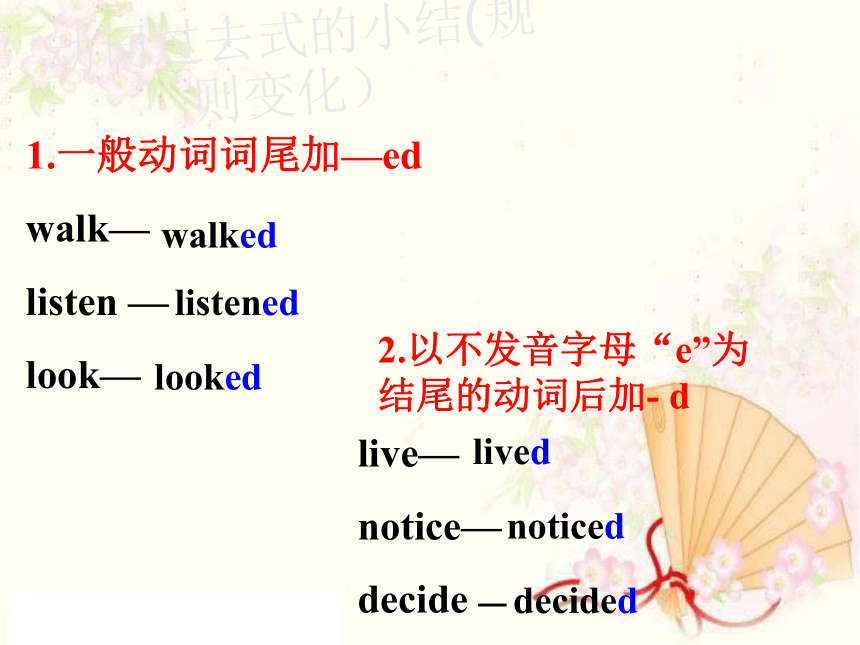
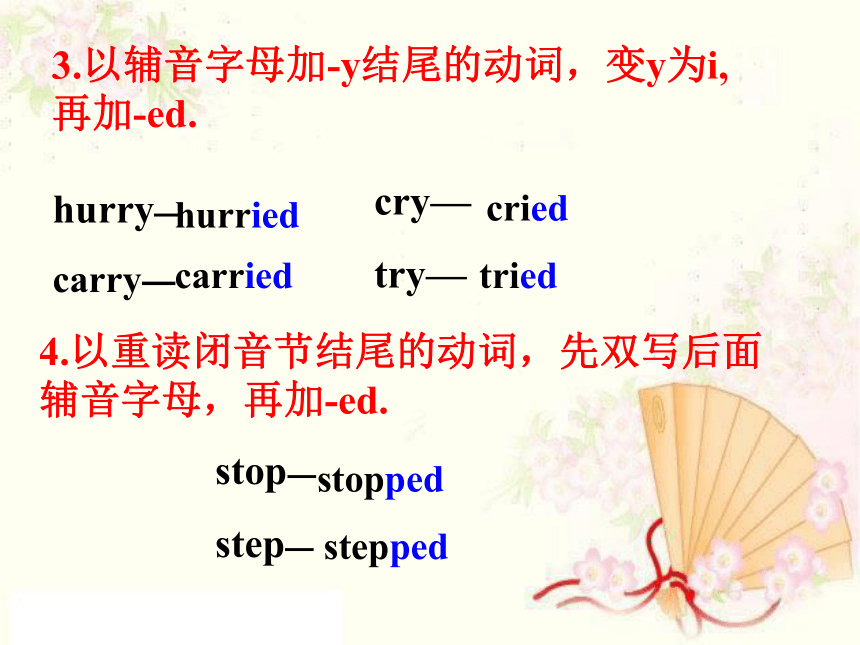
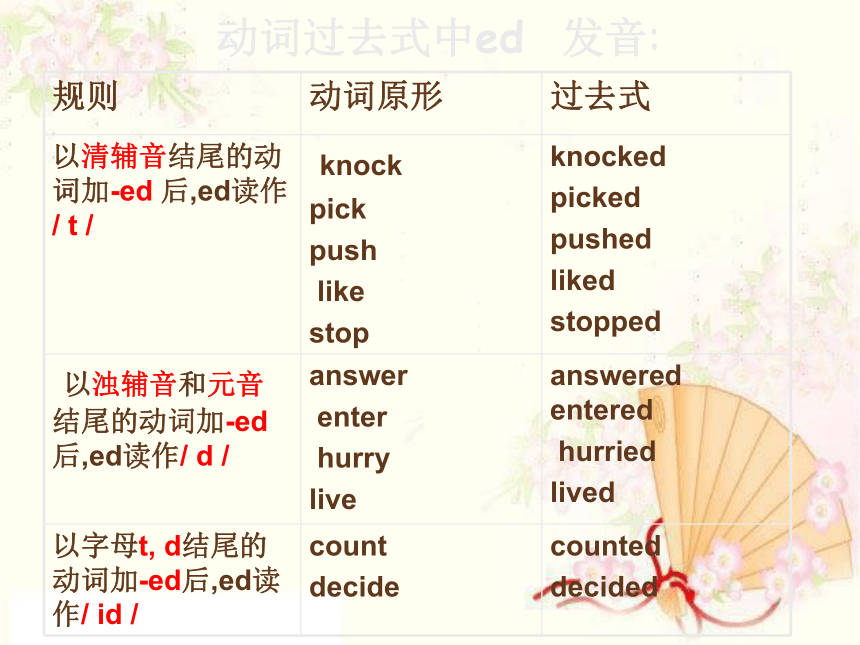
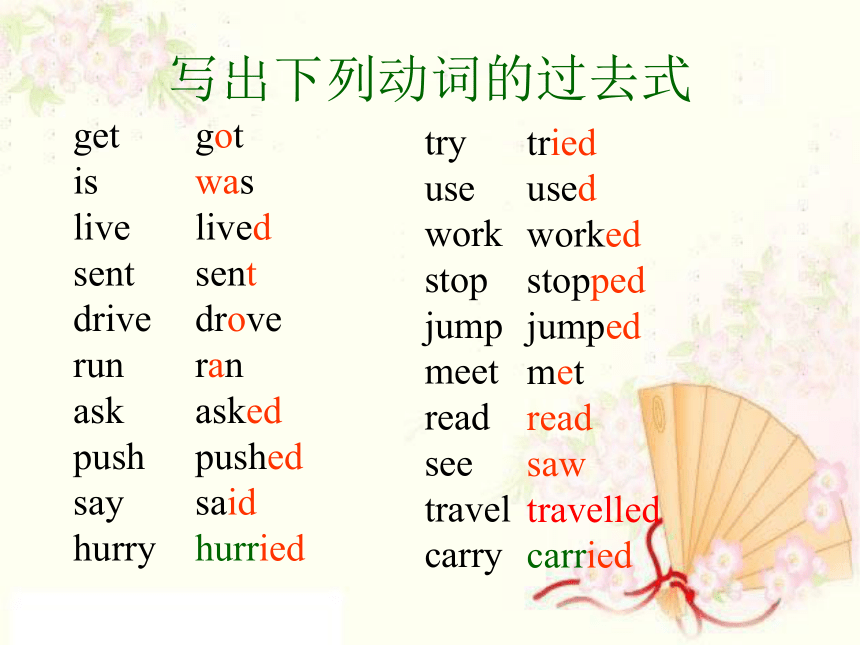
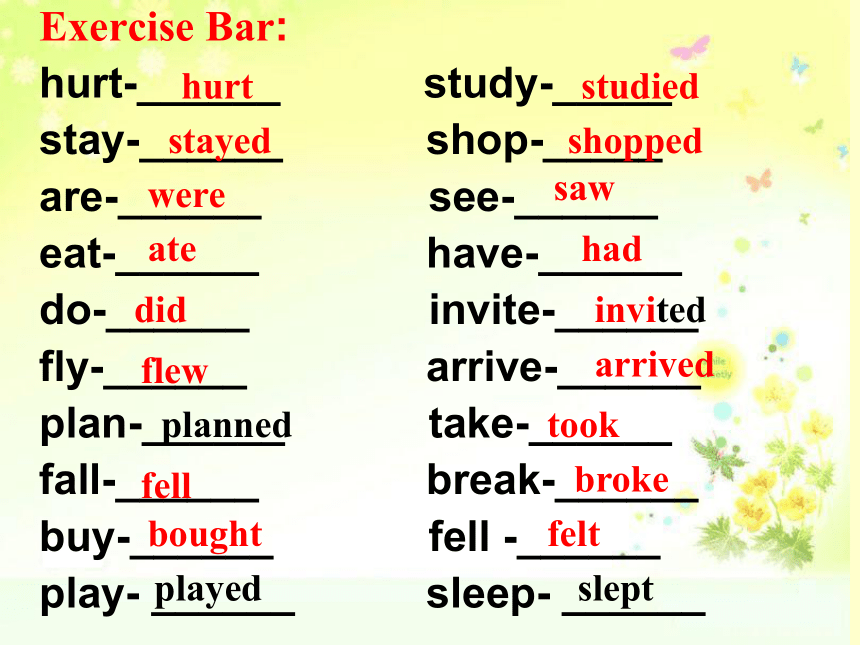
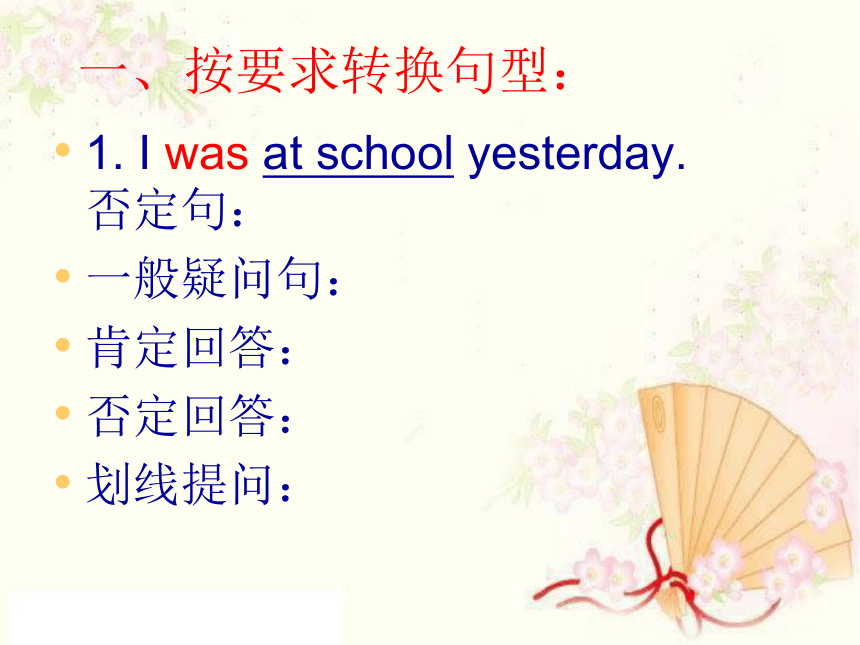
文档简介
课件35张PPT。The Simple Past Tense一般过去时复习一般过去时的用法1、表示过去某个时间发生的动作或存在的状态。
He was at home yesterday.
I got up at six thirty yesterday morning.
I visited my aunt last weekend.2、表示过去经常或反复发生的动作。
My father often went to work by bus last year.
When I was a child, I often listened to music.
常用时间常与一般过去时态连用的时间有:yesterday,
the other day, just now
last night (week, month, year…)
two days ago, a week ago, three years ago…
In+一段时间 (如:in 199,in twenty years’ time)主语 + be动词的过去式(was, were)+其他.主语 + be动词的过去式(was, were)+ not +其他.Be 动词的过去式(was, were)+主语 +其他?He was busy yesterday.He was not busy yesterday.Was he busy yesterday?be 动词的过去时:一 用be动词的适当形式填空
1.I ______ at school just now.
2.He ______ at home last week.
3.We _________ students two years ago.
4.There ______ an apple tree in front of my house before .
5.There ________ some milk in the fridge last Sunday. waswerewaswaswas主语 + 行为动词的过去式+其他.主语 +didn’t + V原型+其他.Did +主语+V原型 +其他?He walked to school yesterday.He didn’t walk to school yesterday.Did he walk to school yesterday?行为 动词的过去时:回答肯定:主语+did否定:主语+didn’t肯定回答:Yes, he did.否定回答:No, he didn’t.1.一般动词词尾加—ed
walk—
listen —
look—动词过去式的小结(规则变化)2.以不发音字母“e”为结尾的动词后加- d
live—
notice—
decide —walkedlistenedlookedlivednoticeddecided3.以辅音字母加-y结尾的动词,变y为i,再加-ed.hurry—
carry—
cry—
try—tried4.以重读闭音节结尾的动词,先双写后面辅音字母,再加-ed.stop—
step—
hurriedcarriedcriedstoppedstepped动词过去式中ed 发音:写出下列动词的过去式get
is
live
sent
drive
run
ask
push
say
hurrytry
use
work
stop
jump
meet
read
see
travel
carrygot
was
lived
sent
drove
ran
asked
pushed
said
hurriedtried
used
worked
stopped
jumped
met
read
saw
travelled
carriedExercise Bar:
hurt-______ study-_____
stay-______ shop-_____
are-______ see-______
eat-______ have-______
do-______ invite-______
fly-______ arrive-______
plan-______ take-______
fall-______ break-______
buy-______ fell -______
play- ______ sleep- ______
hurtstayedwereatedidflewplannedfellstudiedshoppedsawhadinvitedarrivedtookbrokeboughtfeltplayedslept一、按要求转换句型:1. I?was?at?school yesterday. 否定句:
一般疑问句:
肯定回答:
否定回答:
划线提问:1. I?was?at?school yesterday.
否定句:I?wasn’t at?school yesterday.
一般疑问句:Were you at?school yesterday?
肯定回答:Yes, I was.
否定回答:No, I wasn’t.
划线提问:Where were you yesterday? 2. They?were?bank?clerks ten?years?ago.
否定句:
一般疑问句:
肯定回答:
否定回答:
划线提问:2. They?were?bank?clerks ten?years?ago.
否定句:
They?weren’t bank?clerks ten?years?ago.
一般疑问句:
Were they??bank?clerks ten?years?ago?
肯定回答:Yes,they were.
否定回答:No, they weren’t.
划线提问:
What were they ten years ago?
What did they do ten years ago?3. He was?a?police?officer in?2003. 否定句:
一般疑问句:
肯定回答:
否定回答:
划线提问:
3. He was?a?policeman in?2003. 否定句:He wasn’t a?policeman in?2003.
一般疑问句:Was he?a?policeman in?2003?
肯定回答: Yes,he was.
否定回答: No, he wasn’t.
划线提问:
What was he in 2003?
What did he do in 2003?4.He?went?to?the?movies?last?night. 否定句:
一般疑问句:
肯定回答:
否定回答:
划线提问:
4. He?went?to?the?movies?last?night. 否定句:
He?didn’t go?to?the?movies?last?night.
一般疑问句:
Did he?go?to?the?movies?last?night?
肯定回答: Yes, he did.
否定回答:No, he didn’t.
划线提问:What did he do last night?
When did he go to the movies?5.I?did?my?homework yesterday?evening. 否定句:
一般疑问句:
肯定回答:
否定回答:
划线提问:5. I?did?my?homework yesterday?evening. 否定句:
I?didn’t do my?homework yesterday?evening.
一般疑问句:
Did you?do?your?homework yesterday?evening?
肯定回答:Yes, I did.
否定回答:No, I didn’t.
划线提问:
What did you do yesterday evening?6. The?students?played football just?now.(刚才) ?否定句:
一般疑问句:
肯定回答:
否定回答:
划线提问:
6. The?students?played football just?now.(刚才) 否定句:
The?students?didn’t play football just?now.
一般疑问句:
Did the?students?play football just?now?
肯定回答:Yes, they did.
否定回答:No, they didn’t.
划线提问:
What did the students do just?now?7. She?took?a?walk last?Sunday?evening. 否定句:
一般疑问句:
肯定回答:
否定回答:
划线提问:7. She?took?a?walk last?Sunday?evening.
否定句:
She?didn’t take?a?walk last?Sunday?evening.
一般疑问句:
Did she?take?a?walk last?Sunday?evening?
肯定回答:Yes,she did.
否定回答:No, she didn’t.
划线提问:
When did she?take?a?walk ?8.?He?had?an?egg for breakfast this?morning. 否定句:
一般疑问句:
肯定回答:
否定回答:
划线提问:8.?He?had?an?egg breakfast this?morning.
否定句:
He?didn’t have?an?egg breakfast this?morning.
一般疑问句:
Did he?have?an?egg breakfast this?morning?
肯定回答:Yes, he did.
否定回答:No, he didn’t.
划线提问:
What did he have for breakfast this?morning?9.?Uncle?Wang?got?up?late yesterday. 否定句:
一般疑问句:
肯定回答:
否定回答:9.?Uncle?Wang?got?up?late yesterday. 否定句:
Uncle?Wang?didn’t get?up?late yesterday.
一般疑问句:
Did Uncle?Wang?get?up?late yesterday?
肯定回答:
Yes, he did.
否定回答:
No, he didn’t.10.?They?came?to?visit?me on?March?1st.
否定句:
一般疑问句:
肯定回答:
否定回答:
划线提问:10.?They?came?to?visit?me on?March?1st.
否定句:
They?didn’t come?to?visit??me on?March?1st. 一般疑问句:
Did they?come?to?visit?me on?January?1st? 肯定回答:Yes, they did.
否定回答:No, they didn’t.
划线提问:
When did they come to visit me?用动词适当形式填空:
1.__you _________ (remember) to buy the eggs?
2. Uncle Wang ______ (come) into the room and
______ (find) something to eat.
3. Who ________(invent) the computer?
4. Lily _______ (study) in the classroom for 2 hours
and then _______ (leave).
5. In the morning Li Lei ____ 20 yuan, but he ______
______20 yuan in the evening.
How much money _____ he ______? ( have) Didremembercamefoundinventedstudiedlefthaddidn’thavedidhave 1. A: I ______ thirteen years old last year. (be)
B: I ______ ______thirteen years old last year. (变否定句)
C:_____ ______thirteen years old last year? (变一般疑问句)
D:Yes, ______ ______./ No, ______ ______. (做肯/否定回答)
2. A: He _______ to Beijing two days ago. (go)
B: He ______ ______to Beijing two days ago. (变否定句)
C: ______ he ______ to Beijing two days ago? (变一般疑问句)
D: Yes, _______ ______./ No, ______ ______.(做肯/否定回答)waswas notWere youI wasI wasn’twentdidn’t goDidgohe didhe didn’t巩固练习:
1. My father __________(arrive) home yesterday.
2. He fell at the bus stop. He _________(hurt) my arm.
3. I ________ (have) a great trip in Beijing last week.
4. “Where ________ (be) you just now?”
“I _______ in the library.”
5. He (live) in Beijing in 1998.
6. We __________(步行)to school yesterday morning.
7. He ___________ (买)a gift for you two months ago.
8. Danny ______(弄断) his tail at the Palace Museum last week.
9. —________ Danny_____________(过得愉快)in Beijing?
—Yes, he did.
10. They _______________________ when it began to rain.
(他们停止踢足球)
arrivedhurthadwerewaswalkedlivedboughtbrokeDidhave funstopped playing footballHomework:
写作A Trip
提示:
1.Where did you go?
2.How did you go there?
3.Who did you go with?
4.What did you do there?
5.How did you feel?
He was at home yesterday.
I got up at six thirty yesterday morning.
I visited my aunt last weekend.2、表示过去经常或反复发生的动作。
My father often went to work by bus last year.
When I was a child, I often listened to music.
常用时间常与一般过去时态连用的时间有:yesterday,
the other day, just now
last night (week, month, year…)
two days ago, a week ago, three years ago…
In+一段时间 (如:in 199,in twenty years’ time)主语 + be动词的过去式(was, were)+其他.主语 + be动词的过去式(was, were)+ not +其他.Be 动词的过去式(was, were)+主语 +其他?He was busy yesterday.He was not busy yesterday.Was he busy yesterday?be 动词的过去时:一 用be动词的适当形式填空
1.I ______ at school just now.
2.He ______ at home last week.
3.We _________ students two years ago.
4.There ______ an apple tree in front of my house before .
5.There ________ some milk in the fridge last Sunday. waswerewaswaswas主语 + 行为动词的过去式+其他.主语 +didn’t + V原型+其他.Did +主语+V原型 +其他?He walked to school yesterday.He didn’t walk to school yesterday.Did he walk to school yesterday?行为 动词的过去时:回答肯定:主语+did否定:主语+didn’t肯定回答:Yes, he did.否定回答:No, he didn’t.1.一般动词词尾加—ed
walk—
listen —
look—动词过去式的小结(规则变化)2.以不发音字母“e”为结尾的动词后加- d
live—
notice—
decide —walkedlistenedlookedlivednoticeddecided3.以辅音字母加-y结尾的动词,变y为i,再加-ed.hurry—
carry—
cry—
try—tried4.以重读闭音节结尾的动词,先双写后面辅音字母,再加-ed.stop—
step—
hurriedcarriedcriedstoppedstepped动词过去式中ed 发音:写出下列动词的过去式get
is
live
sent
drive
run
ask
push
say
hurrytry
use
work
stop
jump
meet
read
see
travel
carrygot
was
lived
sent
drove
ran
asked
pushed
said
hurriedtried
used
worked
stopped
jumped
met
read
saw
travelled
carriedExercise Bar:
hurt-______ study-_____
stay-______ shop-_____
are-______ see-______
eat-______ have-______
do-______ invite-______
fly-______ arrive-______
plan-______ take-______
fall-______ break-______
buy-______ fell -______
play- ______ sleep- ______
hurtstayedwereatedidflewplannedfellstudiedshoppedsawhadinvitedarrivedtookbrokeboughtfeltplayedslept一、按要求转换句型:1. I?was?at?school yesterday. 否定句:
一般疑问句:
肯定回答:
否定回答:
划线提问:1. I?was?at?school yesterday.
否定句:I?wasn’t at?school yesterday.
一般疑问句:Were you at?school yesterday?
肯定回答:Yes, I was.
否定回答:No, I wasn’t.
划线提问:Where were you yesterday? 2. They?were?bank?clerks ten?years?ago.
否定句:
一般疑问句:
肯定回答:
否定回答:
划线提问:2. They?were?bank?clerks ten?years?ago.
否定句:
They?weren’t bank?clerks ten?years?ago.
一般疑问句:
Were they??bank?clerks ten?years?ago?
肯定回答:Yes,they were.
否定回答:No, they weren’t.
划线提问:
What were they ten years ago?
What did they do ten years ago?3. He was?a?police?officer in?2003. 否定句:
一般疑问句:
肯定回答:
否定回答:
划线提问:
3. He was?a?policeman in?2003. 否定句:He wasn’t a?policeman in?2003.
一般疑问句:Was he?a?policeman in?2003?
肯定回答: Yes,he was.
否定回答: No, he wasn’t.
划线提问:
What was he in 2003?
What did he do in 2003?4.He?went?to?the?movies?last?night. 否定句:
一般疑问句:
肯定回答:
否定回答:
划线提问:
4. He?went?to?the?movies?last?night. 否定句:
He?didn’t go?to?the?movies?last?night.
一般疑问句:
Did he?go?to?the?movies?last?night?
肯定回答: Yes, he did.
否定回答:No, he didn’t.
划线提问:What did he do last night?
When did he go to the movies?5.I?did?my?homework yesterday?evening. 否定句:
一般疑问句:
肯定回答:
否定回答:
划线提问:5. I?did?my?homework yesterday?evening. 否定句:
I?didn’t do my?homework yesterday?evening.
一般疑问句:
Did you?do?your?homework yesterday?evening?
肯定回答:Yes, I did.
否定回答:No, I didn’t.
划线提问:
What did you do yesterday evening?6. The?students?played football just?now.(刚才) ?否定句:
一般疑问句:
肯定回答:
否定回答:
划线提问:
6. The?students?played football just?now.(刚才) 否定句:
The?students?didn’t play football just?now.
一般疑问句:
Did the?students?play football just?now?
肯定回答:Yes, they did.
否定回答:No, they didn’t.
划线提问:
What did the students do just?now?7. She?took?a?walk last?Sunday?evening. 否定句:
一般疑问句:
肯定回答:
否定回答:
划线提问:7. She?took?a?walk last?Sunday?evening.
否定句:
She?didn’t take?a?walk last?Sunday?evening.
一般疑问句:
Did she?take?a?walk last?Sunday?evening?
肯定回答:Yes,she did.
否定回答:No, she didn’t.
划线提问:
When did she?take?a?walk ?8.?He?had?an?egg for breakfast this?morning. 否定句:
一般疑问句:
肯定回答:
否定回答:
划线提问:8.?He?had?an?egg breakfast this?morning.
否定句:
He?didn’t have?an?egg breakfast this?morning.
一般疑问句:
Did he?have?an?egg breakfast this?morning?
肯定回答:Yes, he did.
否定回答:No, he didn’t.
划线提问:
What did he have for breakfast this?morning?9.?Uncle?Wang?got?up?late yesterday. 否定句:
一般疑问句:
肯定回答:
否定回答:9.?Uncle?Wang?got?up?late yesterday. 否定句:
Uncle?Wang?didn’t get?up?late yesterday.
一般疑问句:
Did Uncle?Wang?get?up?late yesterday?
肯定回答:
Yes, he did.
否定回答:
No, he didn’t.10.?They?came?to?visit?me on?March?1st.
否定句:
一般疑问句:
肯定回答:
否定回答:
划线提问:10.?They?came?to?visit?me on?March?1st.
否定句:
They?didn’t come?to?visit??me on?March?1st. 一般疑问句:
Did they?come?to?visit?me on?January?1st? 肯定回答:Yes, they did.
否定回答:No, they didn’t.
划线提问:
When did they come to visit me?用动词适当形式填空:
1.__you _________ (remember) to buy the eggs?
2. Uncle Wang ______ (come) into the room and
______ (find) something to eat.
3. Who ________(invent) the computer?
4. Lily _______ (study) in the classroom for 2 hours
and then _______ (leave).
5. In the morning Li Lei ____ 20 yuan, but he ______
______20 yuan in the evening.
How much money _____ he ______? ( have) Didremembercamefoundinventedstudiedlefthaddidn’thavedidhave 1. A: I ______ thirteen years old last year. (be)
B: I ______ ______thirteen years old last year. (变否定句)
C:_____ ______thirteen years old last year? (变一般疑问句)
D:Yes, ______ ______./ No, ______ ______. (做肯/否定回答)
2. A: He _______ to Beijing two days ago. (go)
B: He ______ ______to Beijing two days ago. (变否定句)
C: ______ he ______ to Beijing two days ago? (变一般疑问句)
D: Yes, _______ ______./ No, ______ ______.(做肯/否定回答)waswas notWere youI wasI wasn’twentdidn’t goDidgohe didhe didn’t巩固练习:
1. My father __________(arrive) home yesterday.
2. He fell at the bus stop. He _________(hurt) my arm.
3. I ________ (have) a great trip in Beijing last week.
4. “Where ________ (be) you just now?”
“I _______ in the library.”
5. He (live) in Beijing in 1998.
6. We __________(步行)to school yesterday morning.
7. He ___________ (买)a gift for you two months ago.
8. Danny ______(弄断) his tail at the Palace Museum last week.
9. —________ Danny_____________(过得愉快)in Beijing?
—Yes, he did.
10. They _______________________ when it began to rain.
(他们停止踢足球)
arrivedhurthadwerewaswalkedlivedboughtbrokeDidhave funstopped playing footballHomework:
写作A Trip
提示:
1.Where did you go?
2.How did you go there?
3.Who did you go with?
4.What did you do there?
5.How did you feel?
同课章节目录
- 词法
- 名词
- 动词和动词短语
- 动词语态
- 动词时态
- 助动词和情态动词
- 非谓语动词
- 冠词
- 代词
- 数词和量词
- 形容词副词及其比较等级
- 介词和介词短语
- 连词和感叹词
- 构词法
- 相似、相近词比较
- 句法
- 陈述句
- 一般疑问句和否定疑问句
- 特殊疑问句及选择疑问句
- 反意疑问句
- 存在句(There be句型)
- 宾语从句
- 定语从句
- 状语从句
- 主谓一致问题
- 简单句
- 并列句
- 复合句
- 主谓一致
- 主、表语从句
- 名词性从句
- 直接引语和间接引语
- 虚拟语气
- 感叹句
- 强调句
- 倒装句
- 祈使句
- 句子的成分
- 句子的分类
- 题型专区
- 单项选择部分
- 易错题
- 完形填空
- 阅读理解
- 词汇练习
- 听说训练
- 句型转换
- 补全对话
- 短文改错
- 翻译
- 书面表达
- 任务型阅读
- 语法填空
- 其他资料
